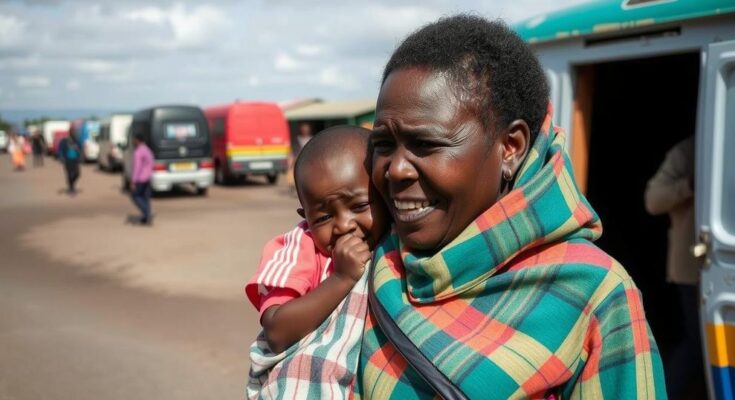Approximately 13,000 refugees have fled Mozambique to Malawi following post-election violence. The unrest, stemming from contested election results, has escalated into widespread looting and violence. Malawi is currently facing food shortages while providing refuge to these marginalized individuals. Humanitarian organizations are responding with support and facilities amid rising concerns regarding health and safety.
On a recent Saturday afternoon, Manase Madia, a 50-year-old Mozambican, displayed his identity card, once a symbol of pride but now a remnant of instability. In recent weeks, armed violence has marred his community as homes were set ablaze and businesses, including Madia’s, looted. Fearing for his family’s safety, which has since dispersed, he became part of a larger wave of approximately 13,000 individuals fleeing Mozambique to seek refuge in Malawi due to widespread post-election violence.
The unrest erupted after the October 11 election that resulted in the ruling Frelimo party’s Daniel Chapo being declared the winner, a decision contested by the opposition. Subsequent violence escalated, initially targeting political figures, but later engulfing innocent civilians in criminal activities and looting. Madia, warned of impending danger, evacuated his family, fleeing with them on a motorcycle, leaving behind destroyed property and stolen livestock.
While some relatives remain in hiding, Madia reported how many of his neighbors share a similar plight. The harrowing migration of refugees to Malawi has been a stark reminder of the civil war in Mozambique, where millions sought safety in the neighboring country decades ago. The journey into Malawi was marked by desperation, with many newcomers arriving with nothing but the clothes they wore.
Despite battling severe food shortages due to drought conditions, the Malawian population has welcomed refugees with open arms, aided by the government’s declaration of a humanitarian disaster and calls for international assistance. The influx has strained local resources as authorities, alongside entities like the UNHCR and Red Cross, work to establish temporary shelters and address health concerns among the newly arrived.
Judith Fukizi from the International Red Cross’s Restoring Family Links initiative reported efforts to reconnect family members separated by violence. Hilda Katema Kausiwa of the Ministry of Homeland Security highlighted ongoing assessments for health and sanitation needs in refugee camps. As the situation evolves, local organizations and authorities stress the importance of comprehensive support for displaced individuals as well as the host communities becoming increasingly burdened.
The influx of refugees from Mozambique into Malawi originates from escalating violence following election disputes. The October 2023 elections stirred tensions between the ruling Frelimo party and the opposition, resulting in widespread civil unrest. Historically, Mozambique has experienced similar patterns of conflict leading to mass emigration, particularly during its civil war. The current crisis mirrors past refugee movements, stressing the plight of affected individuals, their desperate escapes, and the capacity of the receiving nations to accommodate them amid their struggles.
In conclusion, the wave of refugees fleeing Mozambique underscores the dire consequences of political violence, echoing historical patterns of displacement. As Malawi grapples with its own challenges, the resilience and hospitality of its people towards the newcomers provide a glimmer of hope amidst adversity. However, comprehensive support remains imperative to address both the immediate needs of the refugees and the pressures faced by host communities, warranting continued international attention and assistance.
Original Source: www.theguardian.com




